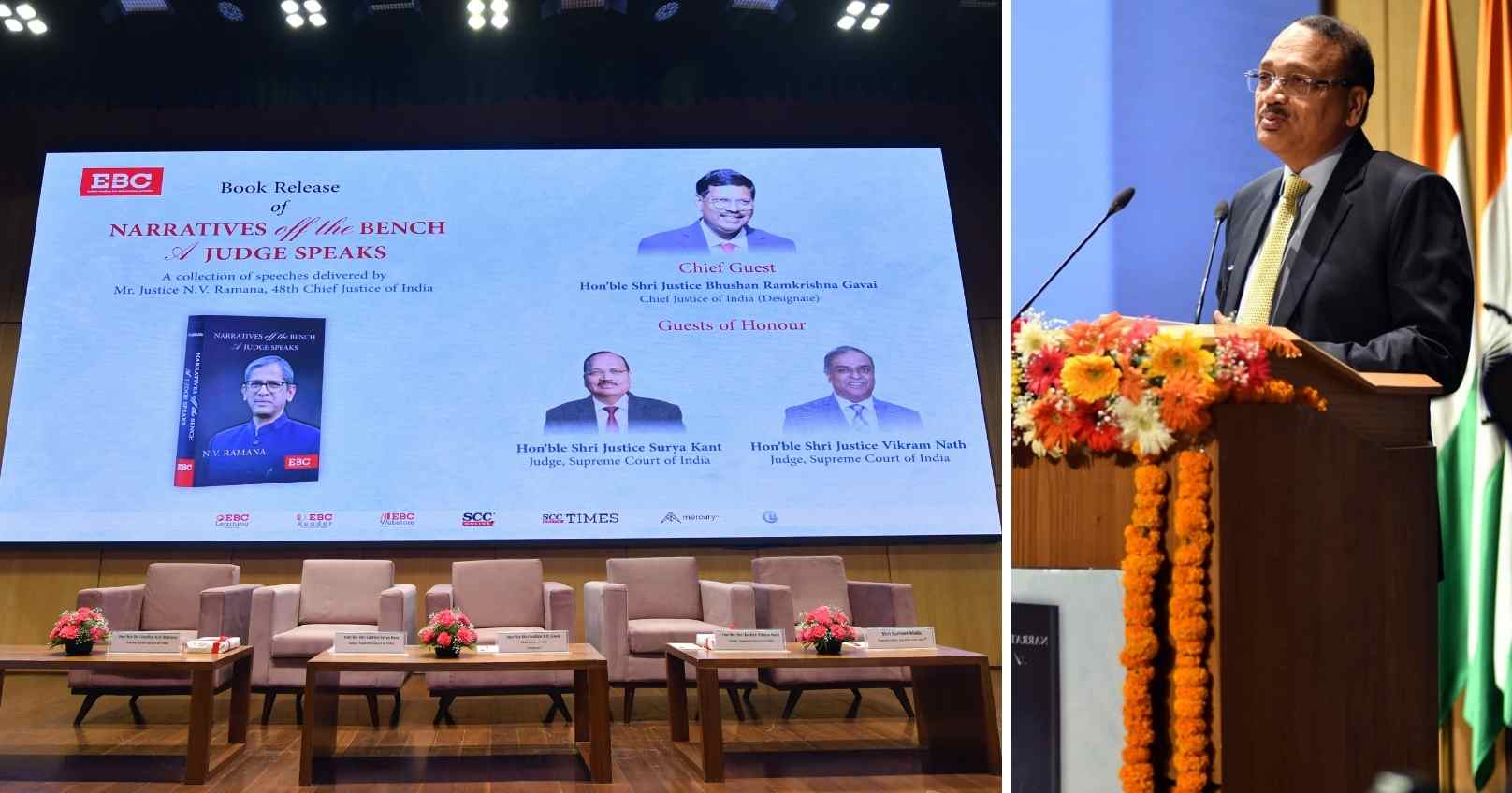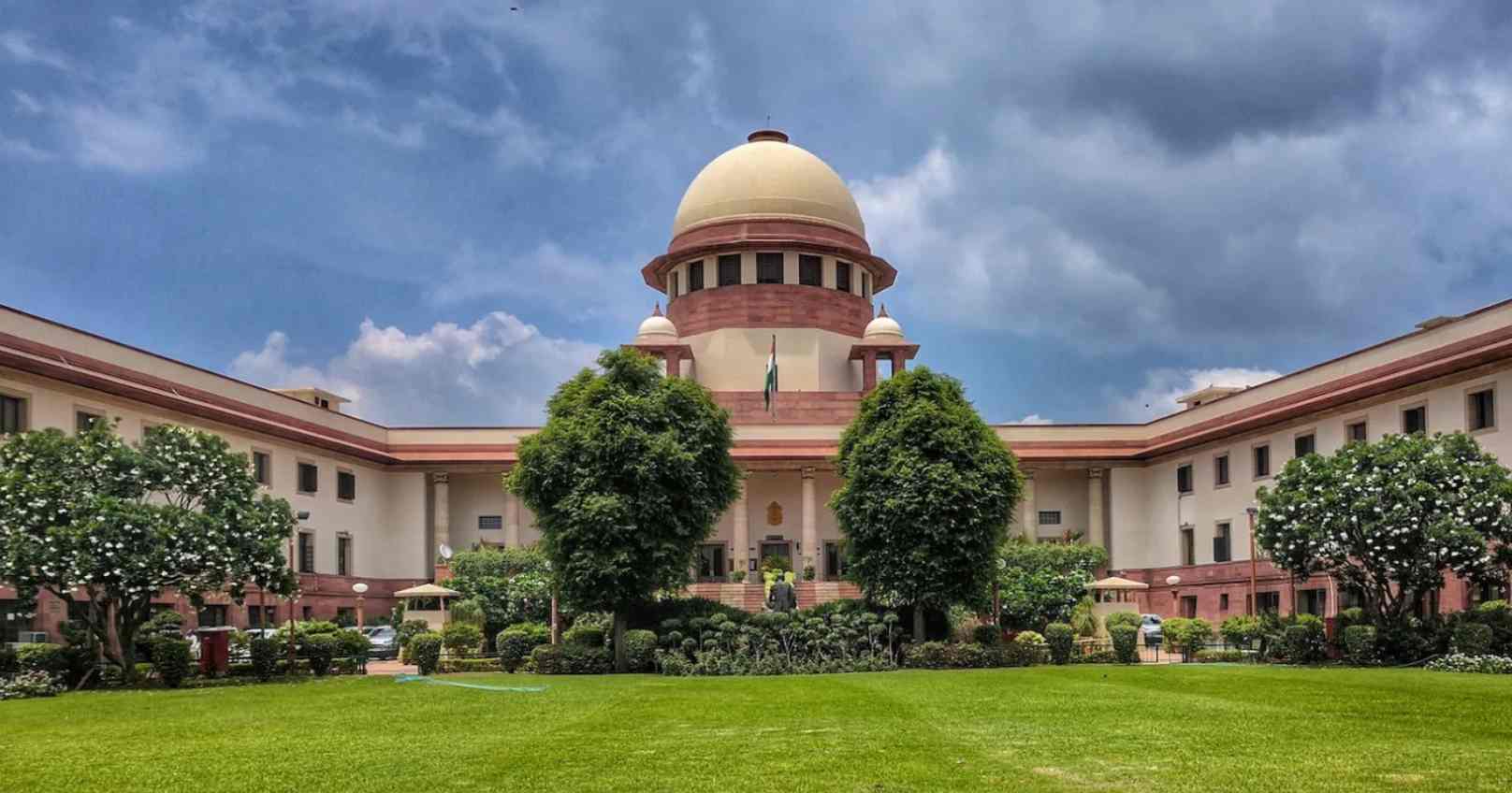There is a need for Judges to step beyond the confines of the courtroom and engage thoughtfully and meaningfully with the public, said Justice Suryakant at the book launch of - Narratives off the Bench: A Judge speaks, a collection of speeches by Justice NV Ramana, who served as the Chief Justice of India at the Delhi High Court Auditorium. Justice Bhushan Gavai, Justice Vikram Nath were also present on the ocassion, while those in attendance included Judges, advocates from all across India.
When judges share their insights and opinions in public forums, they perform a vital democratic function. On the dais, they demystify the law. However, in public forums or public engagements, they are not limited to the arguments or submissions before them. It is on these occasions that judges can actively engage with the public on broader concerns and pressing issues that may not have reached the courts, but which still impact the entire nation. In these moments, the public sees them not only as arbiters of disputes but as the true custodians of our Constitution, said Justice Suryakant.
By speaking about issues such as the value of education, judicial reforms, and the rights of minorities, judges can pave the way for a change in societal outlook. When someone in a position of grave responsibility speaks about ideals and principles that are meant to elevate society, they influence public perception. Theycan make certain ideas more palatable; and over time, these ideals can become the new reality...through countless engagements during his tenure as the Chief Justice of India, Justice Ramana has often reflected on the delicate balance between judicial detachment and societal engagement. In his addresses, he has consistently emphasized that while a judge must uphold strict impartiality and restraint within the courtroom, he must not lose touch with the realities, struggles, and aspirations of the people outside it. I do not see this book as a mere compilation of addresses; I see it as a tribute to the enduring dialogue between the judiciary and the society it serves. This collection of speeches champions a principle of utmost importance: the need for judges to step beyond the confines of the courtroom and engage thoughtfully and meaningfully with the public, Justice Suryakant said.
Below is an excerpt from Justice Suryakant's speech:
For instance, in the midst of the COVID-19 pandemic, Justice Ramana called for heightened transparency by advocating the live telecasting of Supreme Court proceedings. This call sparked a chain reaction, leading to daily proceedings in the Supreme Court and many High Courts being livestreamed. This has enhancedpublic access to justice in unprecedented ways.
Moreover, public engagement by judges reinforces judicial accountability. The challenges confronting our judicial system—from burgeoning case backlogs and infrastructural deficiencies to barriers in access to justice—are not abstract policy concerns. They are real problems that impact the daily lives of millions of our fellow citizens. When judges speak candidly about these systemic hurdles, their voices lend weight to calls for reform.Their voices inspire action and innovation, not only within the legal community but across the broader fabric of society. To help overcome the woes faced by the public in accessing justice, Justice Ramana has persistently called for modernization through technology, simplified legal procedures, and better infrastructure. We can see the results of this advocacy before us: in the past five years, we have made huge strides towards digitising case records and filings across the country, virtual appearances by advocates and litigants have become commonplace, and the State has increased investment in infrastructure for the justice delivery system.
In multiple national and international events, Justice Ramana has used his voice to encourage and shape dialogue on current events and long-persisting social problems. He has recognized the plight of women in society, not just as professionals in law, but also as consumers of justice. He has also recommended a plethora of legislative changes to attain the goals of gender justice. Alongside this, he has passionately spoken about the need to increase the representation of women in law and the methods to do so, such as preference in appointments. By pointing out an age-old problem—that though the number of women pursuing law has increased over the years, women are still compelled to give up their bright careers due to societal expectations—he has encouraged dialogues on diversity and inclusivity. His consistent engagement with such issues reminds us that when judges speak beyond the bench, they do not stray from their constitutional duties; in fact, they fulfil them.
When judges step into the public eye, they become mentors and sources of inspiration for the next generation. Lawyers, law students, and engaged citizens draw strength and guidance from their advice, their journeys, and the examples they set. When judges speak about the struggles they faced in their careers, they provide solace to young professionals; when judges talk about environmental concerns, they shine a spotlight on plans for combating climate change; and when judges validate the struggles of minorities, they create awareness amongst the majority. In doing so, they nurture a society that is more inclusive, more empathetic, and more attuned to the noble ideals of justice and equity. Their speeches and writings become enduring guides for those who aspire to serve the law with integrity, courage, and dedication.
As we celebrate the launch of "Narratives Off the Bench," we appreciate this collection as the embodiment of those ideals. Justice Ramana’s reflections offer incisive legal thought and lived experiences about the role of judges as thoughtful, measured public figures. This book reminds us that when a judge’s voice is raised with care, humility, and purpose, it can illuminate the path toward a more just, humane, and equitable society. As we turn its pages, let us be reminded of the enduring need to strengthen the bonds between the bench and the public.
I earnestly hope that this book will inspire many more voices—voices of courage, wisdom, and grace—to rise with the same conviction and purpose.







